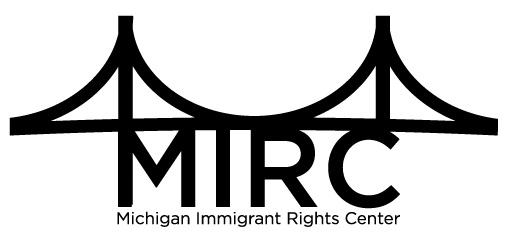Immigrant Rights Defenders: Walking in Crossroads

We work at the Michigan Immigrant Rights Center (MIRC), a legal resource center with a mission to build an environment where immigrant communities experience “equity and belonging.” This is a broad mandate in today’s climate.
We are conscious that immigration in the U.S. is firmly rooted in racist values. Our experience navigating this inherently racist framework, in a diverse context and against the geopolitical backdrop of a White, hegemonic identity, places us in a complex position when dealing with race and other positionalities.
One crucial first step toward consciousness is the acknowledgment of our positionalities and privileges. Without such awareness, limitations prevent us from playing an effective role and restrict our understanding of power dynamics. We surveyed our colleagues regarding their own experiences, and have included some of their quotes for reflection throughout the piece.
“I am a college educated, middle class, heterosexual, protestant Christian and all of these identities intersect with my race and give me privilege, [both] in society at large and in relation to our clients.”
“I am multiracial. Mostly Indigenous, and wide range of other races. I am Brown. I am aware of my lighter skin color and understand how that it is a privilege coming from communities that, through the colonization of our life, have inherited racism in the shape of colorism.”
It is key to differentiate between acknowledgement of racial barriers and the experience of racial oppression, the latter being what most of our clients navigate. Both fuel a desire to use whatever privilege we have to end power that is unconscious and uncritical.
“There are certain aspects of my personal experience that give me perspective to personally sympathize and also motivate intentionality around staying present and dedicated to the struggle, but my privileges keep me squarely in line as an ally.”
“I was born in a refugee camp. Being born countryless offered me a great deal of consciousness about my positionality as a refugee and inspired me to work as an advocate for immigrant rights.”
“I try to use my positionality as a shield for my clients and as a sword against societal views on race.”
Advocating for immigrants involves everyday interactions ripe with interpersonal and internalized racism. By identifying and striving to be as mindful as we can in our role, our advocacy takes root in ideals of race consciousness. Creating “equity and belonging” is a task that we embrace as a conscious practice in our interactions within our work spaces.
“... I am easily able to navigate spaces with other mostly white women. There are so many white women in the world of immigrant rights advocates ... at least in Michigan ... I oftentimes question whether it makes sense for me to be another white woman doing immigrant rights work ... in Michigan. For now, I work to use the respectability I hold in these spaces because of many of my identities, to push these spaces to decolonize and reject the pervasive service provider lens. And to become less white.”
“With colleagues who are leaders in communities of color, white privilege is something I need to be very aware of as I speak … and as we set advocacy priorities together.”
“I am biased toward preferring and feeling more comfortable around POC than white people. However, I also am aware that I work in an area that is dominated by white women. I try my best to not let this bias affect my interaction with colleagues.”
As immigrant right defenders, our interaction with the legal system exposes us to the structural racism in the immigration realm as well.
“I have a hard time with the idea that there are ‘deserving’ immigrants and that it is measured through how precarious your life is and how bad is the suffering of an individual.”
“Immigration law is racist! I personally feel that if I do not push for reforms and change that strives for equity I am basically justifying, enabling and perpetuating a racist institution.
“Understanding that the immigration law has always been designed to perpetuate white dominance and is being re-weaponized in some new ways right now to further that end is critical in our work. As a person with white privilege, I have the ability to lift that up with white audiences and institutional leaders and leverage my positionality as I do ...I've come to understand that as an obligation and not merely an option.”
Immigrant rights defenders have a particular position in the racial inequality that marks our society. Therefore, there is an urgent need to create brave spaces in our workplaces for dialogue that will help us reflect on our daily practice and interactions.
The aim of this piece was to invite a process of dialogue, reflection, and action to embody Praxis. As Paulo Freire stated in his book Pedagogia do Oprimido, “Without a sense of identity, there can be no real struggle.”
